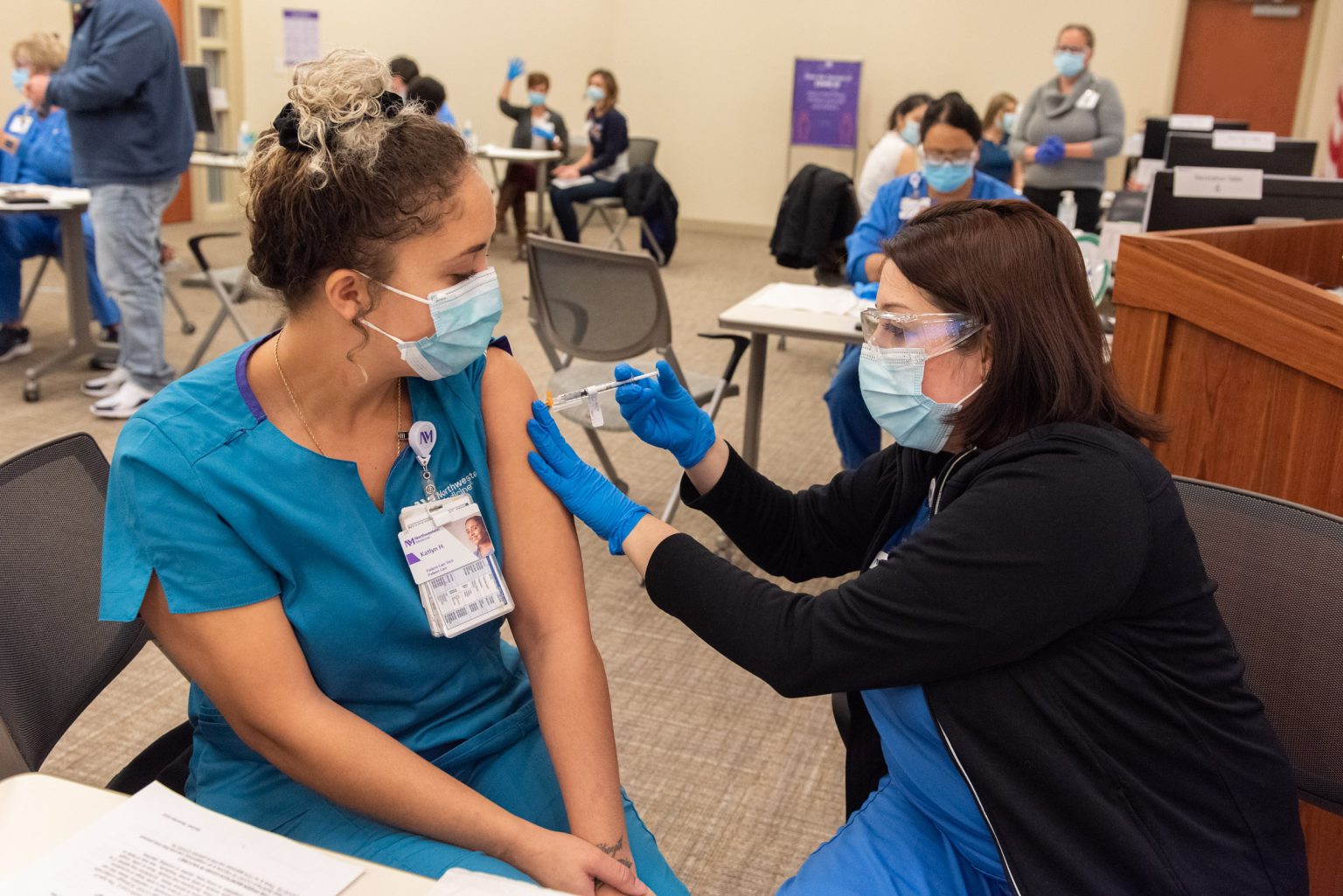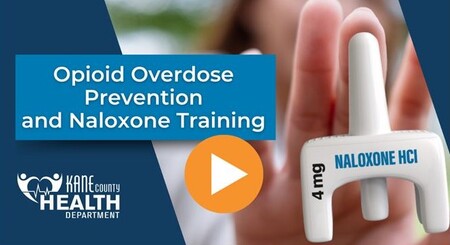The Food and Drug Administration (FDA) issued Emergency Use Authorization (EUA) for the Pfizer-BioNTech COVID-19 vaccine and Moderna COVID-19 vaccine in December 2020. Northwestern Medicine Delnor Hospital started administering the vaccine to healthcare workers on December 16. Although many are excited about the vaccine, health officials know that many others have questions and concerns about it.
“There is a lot of angst surrounding the COVID-19 vaccine,” says Jay Liu, MD, PhD, infectious diseases at Northwestern Medicine Delnor Hospital. “Some of it is based on legitimate questions that are not answerable given our current level of data and study, and others are based on deliberate misinformation and non-fact based anxiety.”
Since there are not currently any effective therapies to “cure” COVID-19 without excess morbidity or even mortality, Dr. Liu says the best bet is to prevent people from acquiring it in the first place, which is why the vaccine is so important.
“We have a moral obligation to our fellow mankind to protect the community by not contributing to the continued spread of COVID-19, which is so much worse than a ‘glorified flu’”, Dr. Liu says.
Michael G. Ison, MD, infectious diseases and organ transplantation specialist at Northwestern Medicine, has spent the majority of his career focused on infectious diseases and respiratory viruses.
“I got an mRNA COVID-19 vaccine as soon as it was offered to me,” Dr. Ison said. “I chose to get the vaccine because the research suggests it will protect me.”
Here, Dr. Ison answers the most commonly asked questions about the vaccine.
NOTE: As clinical trials expand upon data around vaccine safety and efficacy, the Centers for Disease Control and Prevention (CDC) provides the most up-to-date evidence-based recommendations.
Which vaccine should I get?
The Pfizer-BioNTech and Moderna COVID-19 vaccines were available first and distributed in accordance with the CDC’s recommendations for fair, ethical and transparent distribution. The availability of vaccines in the U.S. is expected to increase over time to eventually have enough to vaccinate 350 million people.
Consult your primary care physician to discuss which vaccine is available to you. Dr. Ison anticipates that over time, as more vaccines and more data are available, physicians and other healthcare providers may recommend specific vaccines for certain people.
Are the two mRNA vaccines from Pfizer-BioNTech and Moderna interchangeable?
No. Both vaccines require two doses, but you must receive the same vaccine for each dose. For example, you cannot get one dose of the Pfizer-BioNTech COVID-19 vaccine followed by one dose of the Moderna COVID-19 vaccine.
What are the benefits of getting vaccinated?
Current data shows that 94% to 95% of people who receive two doses of the Pfizer-BioNTech or Moderna COVID-19 vaccines will not get COVID-19. For people who do get infected despite vaccination, the disease is generally mild.
Who should and should not get vaccinated?
The goal is for every adult patient to have the option to be vaccinated as soon as the supply is available. For the Pfizer-BioNTech COVID-19 vaccine, EUA from the FDA was granted for those age 16 and older. For the Moderna COVID-19 vaccine, EUA from the FDA was granted for those age 18 and older.
However, clinical trials leading to the EUA for these mRNA vaccines did not include pregnant and lactating women, children, nor people with severe allergies. Talk to your primary care physician to weigh the risks and benefits as outlined by the FDA if any of the following apply to you:
- You have HIV infection or another immunocompromising condition
- You are pregnant or plan to be pregnant
- You are breastfeeding
- You have any allergies
- You have a fever
- You have a blood disorder or are on a blood thinner
- You have received a different COVID-19 vaccine
You also should not receive the COVID-19 vaccine within two weeks of receiving any other vaccine, including the flu vaccine.
How does the vaccine work?
In contrast to more traditional vaccines that inject a weakened or inactivated version of the virus into your body, the Pfizer-BioNTech and Moderna COVID-19 vaccines deliver a version of the COVID-19 genetic code, called messenger RNA (or mRNA), to your cells.
- This mRNA uses the cell’s machinery to produce a harmless protein called a spike protein, similar to what is found on the SARS-CoV-2 virus.
- Once the spike protein is created, the original vaccine material is destroyed in your body.
- Your immune system will no longer recognize the cells with the spike protein and will react to them as intruders, or “antigens.”
- Your body will then develop “antibodies,” which act as soldiers to destroy the antigens.
- Your immune system’s “memory cells” store the information for how to make these antibodies, so if you are exposed to the virus in the future, your immune system will know how to respond.
What if I have allergies?
According to the CDC, those who have had severe reactions to other vaccines or injectable drugs are still approved to receive the Pfizer-BioNTech or Moderna COVID-19 vaccine. Patients with allergies who get vaccinated will need to be monitored for 30 minutes following vaccination, compared to patients without allergies who will be monitored for 15 minutes.
How many doses do I need to get?
You should receive two doses of the Pfizer-BioNTech or Moderna COVID-19 vaccine.
- For the Pfizer-BioNTech vaccine, the second dose should be given at least 21 days after the first.
- For the Moderna vaccine, the second dose should be given 28 days after the first.
Can the vaccine give me COVID-19?
You cannot get COVID-19 from the Pfizer-BioNTech nor Moderna COVID-19 vaccine. The mRNA vaccines do not contain the virus that causes COVID-19, so there is no way for you to get infected through vaccination.
Are there side effects?
Side effects are similar to what you might experience with other vaccines. The most common side effects are mild, and include fatigue, headache, fever and chills. These side effects may occur as a result of your body’s work to create immunity to the virus and are a sign that the vaccine is working. Such side effects should go away within a few days.
Please note that some people will not have any side effects, and some people may experience significant side effects. It is advised to consult your provider if:
- You are experiencing any side effects for more than a few days.
- You notice that the area where you received the vaccine increases in redness or tenderness over 24 hours.
- You become worried by your side effects.
The CDC recommends that patients report any side effects via V-safe, a smartphone-based tool.
Can I get the COVID-19 vaccine if I’ve had the flu vaccine this year?
Yes, but the CDC recommends that the Pfizer-BioNTech and Moderna COVID-19 vaccine be given at least two weeks before or after any other vaccine. Consult your primary care physician before getting vaccinated, and review the CDC’s comprehensive recommendations for both the flu vaccine and the COVID-19 vaccine.
If I have had COVID-19 and/or tested positive for antibodies to the virus that causes COVID-19, do I need the vaccine?
According to the CDC, more research is needed to determine how long patients who have recovered from COVID-19 will be protected by natural immunity. Therefore, even if you’ve had COVID-19 or positive detection of antibodies, data shows the vaccine will likely benefit you: It could boost your natural immunity or build immunity if your natural immunity has decreased over time. In most cases, a 90-day period after recovery or testing positive for antibodies will be advisable.
How long should I wait to get vaccinated if I believe I am exposed to COVID-19? Should I get tested for COVID-19 first?
It is advised that you wait at least until you are no longer required to isolate or quarantine before getting the COVID-19 vaccine. At this time, it is not recommended to get tested for COVID-19 before getting vaccinated.
Can I spread COVID-19 once I am vaccinated? Do I still need to wear a mask?
Once you have been vaccinated, you should continue behaving as though you haven’t been vaccinated: Wear a mask, maintain physical distance and wash your hands.
- These vaccines are not 100% effective, so there is a chance you could still get and spread the disease after vaccination.
- These vaccines may take a week or twoto help your body build immunity, so you could still become infected before the vaccine is able to protect you.
- Clinical trials tested the ability of the mRNA vaccines to prevent and decrease symptoms of COVID-19, but they did not measure whether those vaccinated were carriers of SARS-CoV-2, the virus that causes COVID-19. That means you may still be able to infect others.
Use all tools available to you to protect both yourself and others from COVID-19.
Is vaccination covered by my insurance?
The federal government has indicated that as soon as the supply is available, every person in the U.S. should be able to receive the first two doses of the vaccine at no cost, regardless of insurance coverage.
Northwestern Medicine is closely monitoring the roll-out of the vaccines as well as advice from public health officials to ensure patients have access to them at the appropriate time. Once a time frame can be established, patients of Northwestern Medicine will receive information on when and how they can schedule their appointments to receive the COVID-19 vaccine. Until then, prepare yourself by learning more about the benefits of getting vaccinated and the science behind vaccines.








